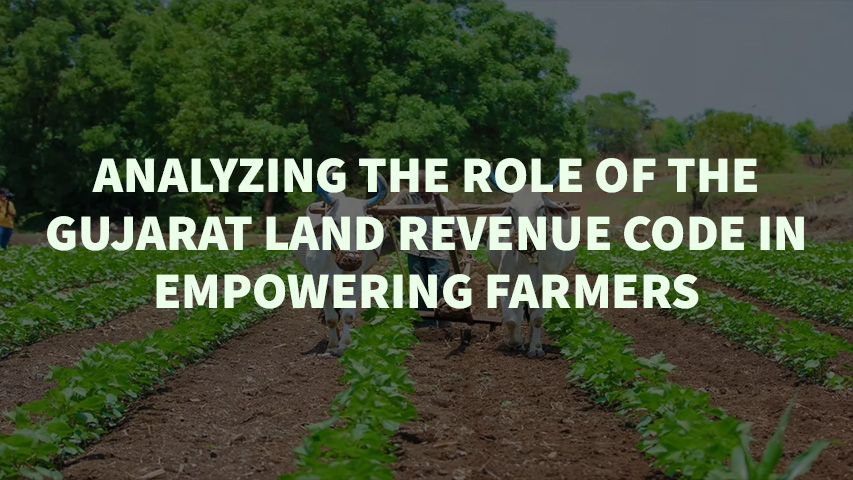
Analyzing the Role of the Gujarat Land Revenue Code in Empowering Farmers
The Gujarat Land Revenue Code plays a crucial role in regulating land rights and revenue collection in the state. With a growing emphasis on agricultural development and farmer empowerment, it is important to analyze the various acts, sections, and case laws related to the code. This article aims to delve into the key provisions of the Gujarat Land Revenue Code, evaluating its impact on farmer empowerment and highlighting relevant legal perspectives.
Contents
The Gujarat Land Revenue Code plays a crucial role in regulating land rights and revenue collection in the state. With a growing emphasis on agricultural development and farmer empowerment, it is important to analyze the various acts, sections, and case laws related to the code. This article aims to delve into the key provisions of the Gujarat Land Revenue Code, evaluating its impact on farmer empowerment and highlighting relevant legal perspectives.
Contents
1. Background and Overview
2. Important Provisions Regarding Farmer Empowerment
3. Case Laws
4. Challenges and Future Prospects
5. Closing Remarks
2. Important Provisions Regarding Farmer Empowerment
3. Case Laws
4. Challenges and Future Prospects
5. Closing Remarks
Background and Overview
The Gujarat Land Revenue Code, 1879 (also known as the Bombay Land Revenue Code, 1879) was initially enacted during the British colonial era to establish a structured framework for the assessment, collection, and regulation of land revenue in Gujarat. Since then, the code has undergone several amendments to align with current agricultural practices and empower farmers.
Important Provisions Regarding Farmer Empowerment
The Gujarat Land Revenue Code, 1879 (also known as the Bombay Land Revenue Code, 1879) was initially enacted during the British colonial era to establish a structured framework for the assessment, collection, and regulation of land revenue in Gujarat. Since then, the code has undergone several amendments to align with current agricultural practices and empower farmers.
Important Provisions Regarding Farmer Empowerment
Tenancy Laws
Section 32 of the Gujarat Land Revenue Code recognizes occupancy rights for tenants by granting them security of tenure. This provision protects tenants from eviction and ensures a stable living and cultivation arrangement.
The Gujarat Tenancy and Agricultural Lands Act, 1948 introduced amendments to the code, providing further protection to tenants by prohibiting arbitrary eviction and regulating the relationship between landlords and tenants.
Land Acquisition and Compensation
The Gujarat Land Acquisition Act, 2013 pertains to the acquisition of land for public purposes and offers farmers protection against dispossession without just compensation.
Section 17 of the Gujarat Land Revenue Code establishes a legal framework for determining fair compensation during land acquisition, ensuring that farmers are adequately compensated for their land.
Agricultural Credit and Support
The Gujarat State Agricultural Credit Board Act, 1965 enables farmers to access credit and financial assistance for agricultural purposes. The act aims to support farmers in enhancing productivity and adopting modern farming techniques.
The Gujarat Land Development Corporation Act, 1978 facilitates land development and reclamation projects, offering farmers technical and monetary assistance for improving their land.
Case Laws
Shantilal Mangaldas Vs. State of Gujarat (1979)
In this case, the Gujarat HC held that non-compliance with the provisions of the Gujarat Land Revenue Code, such as informing a tenant about the resumption of possession, renders the eviction notice invalid.
Kishorebhai Ravjibhai Patel Vs. Vardhmanbhai Mohanbhai (2004)
This case highlighted the issue of fraudulent land transfers by unscrupulous intermediaries. The court reiterated the objective of the Gujarat Land Revenue Code concerning the prevention of fraud and emphasized the need for awareness and diligence among farmers regarding their land transactions.
Dholavira Co-operative Farming Society Vs. Samatbhai Kanaji (1991)
This case dealt with the rights of grazing on gauchar (common grazing) land. The court ruled that unauthorized diversion or encroachment on gauchar land is a violation of the Gujarat Land Revenue Code and reaffirmed the importance of preserving grazing rights for the benefit of farmers.
In this case, the Gujarat HC held that non-compliance with the provisions of the Gujarat Land Revenue Code, such as informing a tenant about the resumption of possession, renders the eviction notice invalid.
Kishorebhai Ravjibhai Patel Vs. Vardhmanbhai Mohanbhai (2004)
This case highlighted the issue of fraudulent land transfers by unscrupulous intermediaries. The court reiterated the objective of the Gujarat Land Revenue Code concerning the prevention of fraud and emphasized the need for awareness and diligence among farmers regarding their land transactions.
Dholavira Co-operative Farming Society Vs. Samatbhai Kanaji (1991)
This case dealt with the rights of grazing on gauchar (common grazing) land. The court ruled that unauthorized diversion or encroachment on gauchar land is a violation of the Gujarat Land Revenue Code and reaffirmed the importance of preserving grazing rights for the benefit of farmers.
Challenges and Future Prospects
Despite the strides made in empowering farmers through the Gujarat Land Revenue Code, there remain challenges that need to be addressed. These include ensuring effective implementation, preventing fraud, and resolving disputes swiftly through streamlined legal processes.
To enhance farmer empowerment, the government could consider further amendments to the code, such as introducing provisions for direct farmer participation in decision-making processes and promoting sustainable agricultural practices.
Closing Remarks
The Gujarat Land Revenue Code serves as a critical tool for the empowerment of farmers in Gujarat. Through its various acts, sections, and relevant case laws, the code protects tenant rights, regulates land acquisition, and provides agricultural credit and support. However, continued efforts are needed to address challenges and further empower farmers. Utmost importance should be given to the effective implementation of the code, ensuring that its provisions lead to tangible benefits for farmers and support sustainable agricultural practices.
